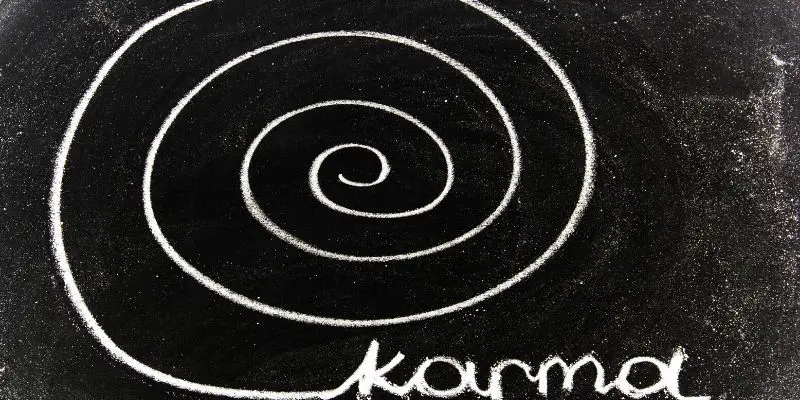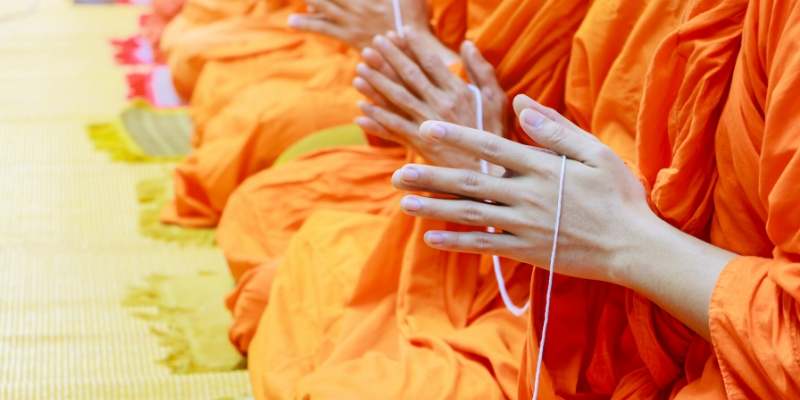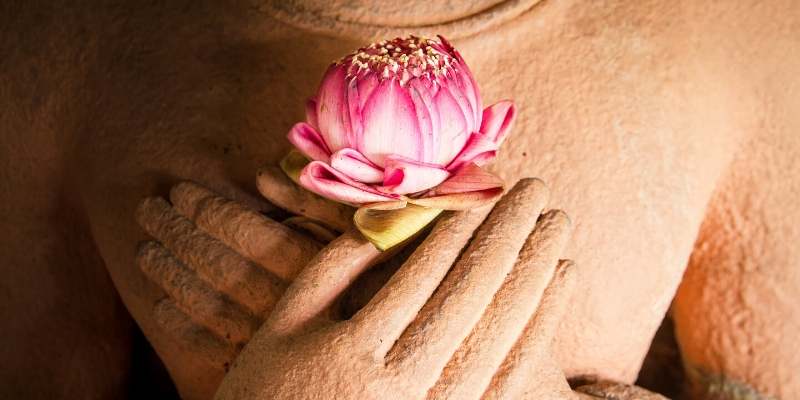Real Karma Meaning: Definition, Origin, & History

Are you interested in a particular topic about Karma meaning? Then use the table of contents below to jump to the most relevant section.
And you can always go back by clicking on the black arrow in the right bottom corner of the page. Also, please note that some of the links in this article may be affiliate links. For more details, check the Disclosure section at the bottom of the page.
Here's what we'll cover:
Karma is a concept taught by various religions and cultures throughout history. It’s an idea that dates back thousands of years. But despite the popularity of the notion, it seems that it’s frequently misunderstood. It’s like being tossed around by various ideologies and religions. And we have no real understanding of its true meaning.
What is the real meaning of karma? Is it the same as punishment? Is it an action or result? Does life revolve around karma and its results? These are just some of the questions that need to be answered.

Origin of Karma

Probably the first mention of Karma was found in ancient Vedic texts around 1000-700 BCE. At that time, the word wasn’t very special or meaningful. And it was referred to as a ritual.
Later mentions tracked in Upanishads Vedas, early Hindu texts.
From 400 B.C.E., the notion of Karma was finally fully developed as we understand it today. And reemerged in other Hindu texts like Mahabharata. Later on, it spread across many different religions and philosophical doctrines all over India and all the Asian countries.

Karma meaning
The word Karma comes from Sanskrit word Karman that literally translates as “act.”
Since this concept is prevalent across several religions, philosophies, and countries, the meaning can slightly vary. In Hinduism and Buddhism, Karma is action.
It includes the things we do, and our actions bring upon inevitable results. Such results may be good or bad, either in this life or after reincarnation. The Hindu religion also views Karma as one of the means of reaching Brahman.
Theosophical scholars, on the other hand, see Karma as a cosmic principle. Karma involves one’s deeds, in which a person rewarded or punished in one incarnation. It also means that our acts from a past incarnation have positive or negative results in the next rebirth.
Popular culture defines Karma as fate or destiny. It involves good or bad emanations that are believed to be generated by someone or something. Some people see Karma as similar to predestination or kismet.
You might also like my article about the most powerful April birthstone

Karma definition

According to Merriam Webster Dictionary, Karma is “the force generated by a person’s actions held in Hinduism and Buddhism to perpetuate transmigration. And in its ethical consequences to determine the nature of the person’s next existence.”
In short, karma is about everything you do. All your activities and work. The Astha mentions that your future depends on your present karma.

Another word for Karma
There are several concepts (not necessarily words) similar to Karma. For instance, “what goes around comes around“, known in Christianity-influenced Western cultures.
Or “midah k’ neged midah “from Judaism, which translates from Hebrew as “value against value.” Another two words to mention in this section are dharma and adharma. In Buddhism and Hinduism, those are known as good Karma and bad Karma, respectively.


The Mixup between Karma and Results
So by definition, karma is action. But many people still get confused with this concept. As a result, they tend to mix karma and results together. Karma is often misused to denote luck, fate or destiny. It is also misused as a way to explain hardships in life.
Many people associate karma this way: what you do to others, they do to you. Let’s look at this more closely. Karma is about what you do to others. What others do to you is the result of your karma. And what other people do to you is their karma. Karma is only the action part.
In a sense, John Lennon’s thought that “instant karma’s gonna get you” is, by definition, incorrect.
Here’s another example: working at the office. Your job activity is your karma. And if you do good, like helping society or your company grow, you’ll be rewarded. It’s like for each and every action; there’s a corresponding result.
Taking a bribe is another form of karma. And this action is punishable by law. Thus, punishment is the result of such karma. Hence, karma is not a punishment.
Therefore, we can say that all actions are karma. And all our actions have results. This also implies that the result of karma influences our subsequent actions. We can also think that karma controls our destiny as a whole. Every action that we do brings us to an inevitable course of life. Life, basically, revolves around karma and its consequences.


Which religion believes in Karma?
The philosophy of Karma can be tracked down in many religions. For some, like Buddhism and Hinduism, it’s a cornerstone notion. For some, it’s maybe slightly less, but still very important.
For instance, In Sikhism, all living beings are described as being under the influence of Maya’s three qualities that bind the soul to the body and to the earth plane. Above these three qualities is eternal time.
Influenced by those qualities, every living being performs actions under the control of the eternal. These activities are called “karma”. The underlying principle of Karma in Sikhism: It brings back the results of actions to the person performing them.
Karma is also an important concept in Taoism. In these teachings, every deed is counted by spirits. And appropriate reward (or punishment) will follow.

In Jainism, nontheistic religion founded in India in the 6th century, Karma is known as karmic dirt, as it’s made of tiny particles of universal matter.
Jainism believes that even thoughts, not only deeds, attract karmic dirt. So Karm can also be described as a matter surrounding the consciousness. And the life we are experiencing is when Karma and consciousness are interacting.

Karma in Hinduism

There are various schools of Hinduism, and they all developed there own vision of Karma.
For instance, Yoga school accounts past-life Karma as secondary to a person’s behavior in the current life, which can eventually lead to enlightenment.
For the Nyaya school of Hinduism, Karma and rebirth are the central notions, and Udayana school suggests that the Karma proved the existence of God, and the list goes on.
The popular view on Karma in the Hindu religion is as a law of nature. Just like gravity, it treats everyone similarly.
According to the law of Karma, man is wholly responsible for his/her actions. He/she is also responsible for everything that is done to him/her. This way, Hindus believe that right actions lead to a virtuous life.

Karma in Buddhism

Originated from Vedic religion, Karma was related to the performance of rituals or the investment in good deeds to ensure the entrance to heaven and not underworld after death.
Karma is derived from the verbal root “kṛ,” which means “do, make, perform, and accomplish.”
On the other hand, the “fruit” or the result of Karma is referred to as “karmaphala.” This concept was originated from a metaphor in agriculture. If one sows a seed, there is a period in which some mysterious invisible process takes place. Then, the plant germinates and later is reaped.
The concept of Karma may not have been so important in early Buddhism, but later gained its popularity. And it has been especially significant for ordinary people. As they need some motivation to deal with life’s everyday struggles, pains, and injustice.
Karma in Buddhism is not the same as “fate” or “predestination”. It’s not God’s judgment. But instead the results of individuals’ actions.
Yes, some might have been happening a long time ago, in previous lives, but what’s essential is responses to today’s events. And those are not predetermined by anyone except for one individual living through it.

Karma symbols
There are many Karma Symbols, given that so many religions and philosophical schools have adopted this concept. Perhaps one of the most recognizable symbols is the Buddhist’s Endless Knot (Shrivastava). It’s a geometric diagram symbolizing the nature of reality. Everything is connected and exist as a part of Karmic cause and effect.

In many Asian countries, Lotus is also quite common in depicting Karma. When it blooms, it still carries the seeds inside. Those are symbolically viewed as the cause, the flower – as an effect. Lotus can also be a way to remind ourselves that anyone (and anything) can grow and develop into something pure and beautiful, even in the muddiest conditions.
Open circle Karma ring by
And, of course, let’s don’t forget about the beautiful open circle symbol. It’s the most common in Western cultures when talking about the concept of Karma.

Tibetan Bhavacakra: The Wheel of Life
More importantly, karma is central to the concept of reincarnation. This concept is similar to “rebirth.” It means a person is reborn in a new human or non-human body after death. A person’s karmic sum (the sum of one’s actions) determines the form he or she will take in the next life.
The Buddhist concepts of karma and karmaphala explain how our actions keep us tied to the “wheel of life.” Samsara, the “cycle of rebirth” has no beginning and end. It is an ever-going process, and that our actions determine the nature of our resurrection.

Is Karma real?
If you find more comfort in science, rather than religion and philosophy. And not entirely persuaded that Karma is real, it can be interesting to know that similarities with Karma can be traced in mainstream psychiatry.
The person responsible is Carl Gustav Jung, who coined the term synchronicity. This notion described “temporally coincident occurrences of acausal events.” Something that most people would have called “fate,” and other science will call a “coincidence.”
But Jung believed that in a person’s life, Synchronicity had a role similar to dreams. It was supposed to move a person’s egocentric conscious reasoning to greater wholeness and spirituality.
Synchronicity glued many other Jung’s concepts together. Including archetypes and the collective unconscious.
And although many scientist’s opponents were criticizing Synchronicity because it was practically impossible to test. But in spite of all the controversy, nowadays, psychoanalysis holds a strong reputation within psychiatry.

The meaning of Karma. Summary
Karma is all about our actions. It involves our past, present, and future actions. Karma itself is not a reward or punishment. Instead, reward or punishment is the result of our karma. Therefore, each action we take will affect us at some time in the future. Scholars believe that this also applies to our thoughts and words. In a sense, karma also revolves around the cycle of cause and effect. Because of this, we are responsible for our karma and its consequences. And since we are accountable for our karma, we should guide ourselves, do good and pursue a righteous path of life.

Disclosure: At Buddhatooth.com we only mention the products that we’ve researched and considered worthy. But it’s important to note that we are a participant of several affiliate programs, including but not limited to VigLink and Amazon Services LLC Associates Program, an affiliate advertising program designed to provide a mean for us to earn fees by linking to Amazon.com and affiliated sites. As an Amazon Associate Buddhatooth.com earns from qualifying purchases.

